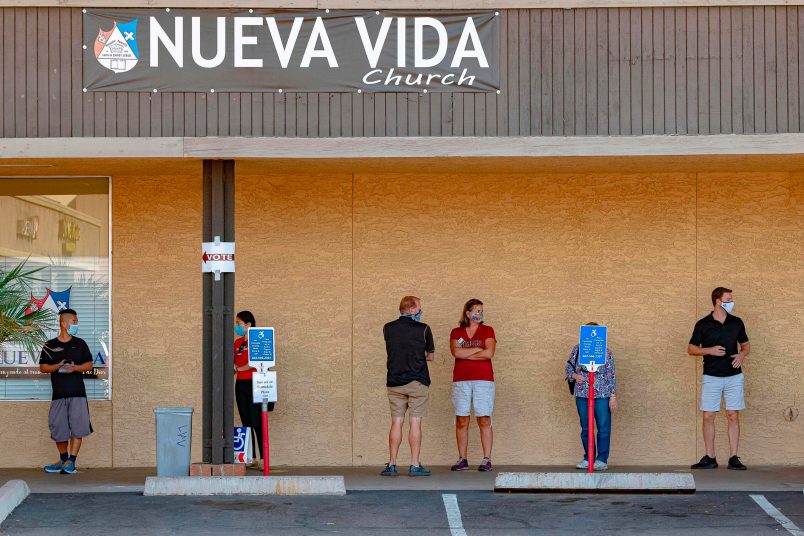Arizona Republicans have been working hard since Donald Trump’s 2020 loss in the state to make voting more cumbersome, and they notched another win in that column last week.
A new law, HB 2492, adds not only a documentary proof of citizenship requirement for voter registrations, but also a documentary proof of residence requirement as well.
The result, voting rights groups and others told TPM, will be a more onerous voter registration process that harms groups who are less likely to have access to the documents now required by law.
“From my perspective, it’s voter suppression pure and simple,” said Chris Gilfillan, political director at Living United for Change in Arizona, or LUCHA, one of several groups suing over the new law.
“Anywhere there was a great increase in the participation of citizens in the process, they want to shut it down, because they didn’t like the results,” said Pinny Sheoran, president-elect of the League of Women Voters of Arizona.
The new requirements will hit hardest those communities with low rates of state IDs — “think about the Native American community up north, think about more impoverished communities in the south along the border,” said Jon Sherman, director of litigation at Fair Elections Center, a voting rights advocacy group.
Rather than “protecting the state’s voters,” as Arizona’s governor claims it will, the new law risks disenfranchising Arizonans already marginalized by mainstream politics.
“It just feels like it’s part of the playbook of targeting people who lack a drivers license, who are disproportionately poor, disproportionately older, disproportionately people who move around a lot, who are homeless or have been homeless — or for whatever reason are facing these kinds of obstacles,” said Emily Kirkland, executive director of Progress Arizona. “That’s part of what’s so frustrating about it.”
Drowning In Photocopies
The new law, which will take effect 90 days after the close of the legislative session, is basically a requirement for voters to submit more paperwork.
Prior to HB 2492, Arizona already required voters to write down their address information on registration forms under penalty of perjury. The state’s voter registration form even includes space for voters without traditional addresses, such as those living in rural areas, to draw a map of their location.
HB 2492 requires that voters supplement this with documents, such as bank statements or utility bills. That adds additional steps — namely scanning or copying the documents and sending them to county election officials to supplement the registration form itself.
The addition of a documentary proof of residence requirement, on top of the proof of citizenship requirement, adds “another obstacle, another hoop that you’ve got to jump through,” said Kirkland.
What’s more, the law doesn’t address tribal identification cards without addresses listed on them, nor does it include any explanation of how homeless voters should prove their registration addresses, which can be locations like homeless shelters or county courthouses.
The open questions about how the law will impact voters has, for now, left registration agencies in a bit of a limbo: Aside from the two lawsuits against HB 2492, which say it blatantly violates U.S. Supreme Court precedent, there’s also the 90-day delay before it takes effect. County election officials — who themselves face new threats of felony prosecution for not adhering to the law’s strict rules — will ultimately administer the new requirements.
Maricopa County, home to Phoenix, has a robust training program for volunteers — known as “deputy registrars” — to learn the recommended procedure for registering voters. Ilene Haber, a communications manager Maricopa County Recorders’ office who oversees the deputy registrars program, told TPM she was waiting on the county’s counsel to interpret the legislation’s new documentary proof of residence requirement.
What About Those Old Drivers Licenses?
Though the law’s new requirements will likely impact would-be voters without state ID cards the most, the text of the bill itself leaves approximately 192,000 Arizonans who do have such cards unaccounted for: These residents were issued state drivers’ licenses before the state began verifying that license recipients were in the country legally, in 1996. Nearly two decades ago, when Arizona enacted a similar registration law requiring proof of citizenship (which was later checked by the U.S. Supreme Court), those voters were grandfathered in. But the new law doesn’t address them specifically.
Though the bill’s sponsor, Rep. Jake Hoffman (R) has said that these voters will be grandfathered into legitimacy, as has Gov. Doug Ducey (R), the lack of legal language to back them up has left some advocates worried that those voters will be forced to re-register.
“Where’s the language?” said Sheoran, of the League of Women Voters. “What a legislator says means nothing if it’s not spelled out in the law.”
Others, like Kirkland and Sherman, said that courts would likely weigh Hoffman and Ducey’s statements — that they didn’t intend to disenfranchise tens of thousands of voters with old licenses — in the event of any legal dispute over those specific registrations.
“It just speaks to how sloppy and illegal this bill is, and the many bills like it, that there’s this huge, looming, open question, and you’re having to look at what the sponsor said on the floor, because it’s so unclear in the text,” Kirkland said.



